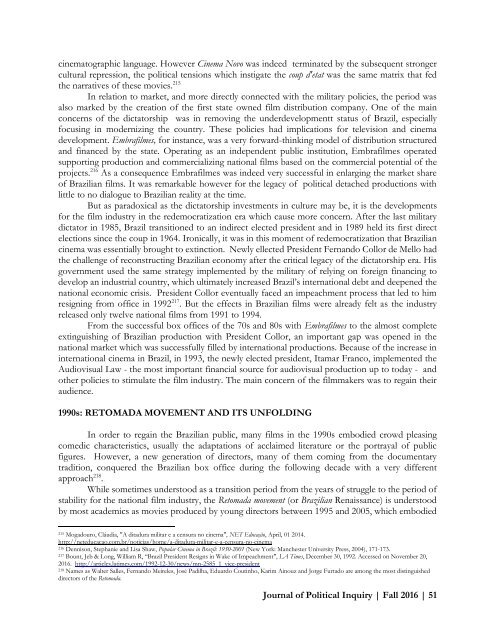Fall2016_Final2
Create successful ePaper yourself
Turn your PDF publications into a flip-book with our unique Google optimized e-Paper software.
cinematographic language. However Cinema Novo was indeed terminated by the subsequent stronger<br />
cultural repression, the political tensions which instigate the coup d'etat was the same matrix that fed<br />
the narratives of these movies. 215<br />
In relation to market, and more directly connected with the military policies, the period was<br />
also marked by the creation of the first state owned film distribution company. One of the main<br />
concerns of the dictatorship was in removing the underdevelopmentt status of Brazil, especially<br />
focusing in modernizing the country. These policies had implications for television and cinema<br />
development. Embrafilmes, for instance, was a very forward-thinking model of distribution structured<br />
and financed by the state. Operating as an independent public institution, Embrafilmes operated<br />
supporting production and commercializing national films based on the commercial potential of the<br />
projects. 216 As a consequence Embrafilmes was indeed very successful in enlarging the market share<br />
of Brazilian films. It was remarkable however for the legacy of political detached productions with<br />
little to no dialogue to Brazilian reality at the time.<br />
But as paradoxical as the dictatorship investments in culture may be, it is the developments<br />
for the film industry in the redemocratization era which cause more concern. After the last military<br />
dictator in 1985, Brazil transitioned to an indirect elected president and in 1989 held its first direct<br />
elections since the coup in 1964. Ironically, it was in this moment of redemocratization that Brazilian<br />
cinema was essentially brought to extinction. Newly ellected President Fernando Collor de Mello had<br />
the challenge of reconstructing Brazilian economy after the critical legacy of the dictatorship era. His<br />
government used the same strategy implemented by the military of relying on foreign financing to<br />
develop an industrial country, which ultimately increased Brazil’s international debt and deepened the<br />
national economic crisis. President Collor eventually faced an impeachment process that led to him<br />
resigning from office in 1992 217 . But the effects in Brazilian films were already felt as the industry<br />
released only twelve national films from 1991 to 1994.<br />
From the successful box offices of the 70s and 80s with Embrafilmes to the almost complete<br />
extinguishing of Brazilian production with President Collor, an important gap was opened in the<br />
national market which was successfully filled by international productions. Because of the increase in<br />
international cinema in Brazil, in 1993, the newly elected president, Itamar Franco, implemented the<br />
Audiovisual Law - the most important financial source for audiovisual production up to today - and<br />
other policies to stimulate the film industry. The main concern of the filmmakers was to regain their<br />
audience.<br />
1990s: RETOMADA MOVEMENT AND ITS UNFOLDING<br />
In order to regain the Brazilian public, many films in the 1990s embodied crowd pleasing<br />
comedic characteristics, usually the adaptations of acclaimed literature or the portrayal of public<br />
figures. However, a new generation of directors, many of them coming from the documentary<br />
tradition, conquered the Brazilian box office during the following decade with a very different<br />
approach 218 .<br />
While sometimes understood as a transition period from the years of struggle to the period of<br />
stability for the national film industry, the Retomada movement (or Brazilian Renaissance) is understood<br />
by most academics as movies produced by young directors between 1995 and 2005, which embodied<br />
215<br />
Mogadouro, Cláudia, "A ditadura militar e a censura no cinema", NET Educação, April, 01 2014.<br />
http://neteducacao.com.br/noticias/home/a-ditadura-militar-e-a-censura-no-cinema<br />
216<br />
Dennison, Stephanie and Lisa Shaw, Popular Cinema in Brazil: 1930-2001 (New York: Manchester University Press, 2004), 171-173.<br />
217<br />
Bount, Jeb & Long, William R, “Brazil President Resigns in Wake of Impeachment", LA Times, December 30, 1992. Accessed on November 20,<br />
2016. http://articles.latimes.com/1992-12-30/news/mn-2585_1_vice-president<br />
218<br />
Names as Walter Salles, Fernando Meireles, José Padilha, Eduardo Coutinho, Karim Ainouz and Jorge Furtado are among the most distinguished<br />
directors of the Retomada.<br />
Journal of Political Inquiry | Fall 2016 | 51
















